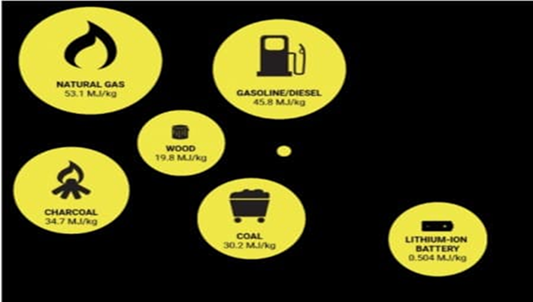Introduction
Energy transition is defined as a long-term structural change in energy systems. These have occurred in the past, and still occur worldwide. Contemporary energy transitions differ in terms of motivation and objectives, drivers and governance. 1
In the context of climate change, energy transition means replacing hydrocarbons (oil, natural gas and coal) with renewable energy.
Increased use of renewable energy, combined with intensified electrification, could prove decisive for the world to meet key climate goals by 2050. Ramping up electricity to over half of the global energy mix (up from one-fifth currently) in combination with renewables would reduce the use of fossil fuels, responsible for most greenhouse-gas emissions. 2
There is no doubt that climate change is happening. But the continuous bombardment of its destructive impact on the globe by media, environmental scientists and doomsday seers is not only infuriating a huge section of the world’s population but it is also putting their backs out.
There were many instances where environmental scientists and University professors have massaged facts and stretched them to breaking point just to justify their research or their political leanings.
Therefore, it is quintessential to separate the truths from the myths when discussing global Energy transition.
Climate Change
Climate change is no longer a fiery apocalypse that we expect to happen in the far-off future. It is real and devastating. Rising sea levels, wild-fires, heatwaves and extreme weather events are already wreaking havoc everywhere and could cost the global economy a staggering $1 trillion dollars over the next five years in crumbling infrastructure, reduced crop yields, health problems, and lost labour according to the Carbon Disclosure Project (CDP). 3
Since January 2019, we have recorded no less than three dozen extreme weather events across the globe, exacerbated by climate change. Each event caused more than $1 billion in damage. According to NASA, the earth's average surface temperature in 2020 tied with 2016 for the hottest years on record, making the last seven years the hottest on record. 4
Unfortunately, any discussion about energy transition usually pits fossil fuels against renewables and quickly degenerates into another predictable polarization story.
There's little doubt that large-scale use of fossil fuels tops the list of factors contributing to climate change (see Figure1).
Figure 1

Source: Courtesy of Brooking.edu, accessed on 24 May 2021.
This begs the question that if there is such concrete evidence that fossil fuels contribute to climate change and other environmental problems, then why do we still use them? Why haven’t we already quit using them? Why is it proving so hard to replace them?
However, the issue isn’t that simple. In order to have a nuanced discussion of climate change and global energy transition, we should objectively discuss claims about excessive weather conditions caused by climate change, drop unsubstantiated claims by environmental activists and divestment campaigners and accept facts as basis of the discussions.
If we go back in history to when records started we could easily find that the very same rising sea levels, wild-fires, heatwaves, and extreme weather conditions had also happened years before. Environmental science has yet to establish unequivocally whether these were caused by human beings alone using fossil fuels or as a result of natural developments or both.
However, some distinguished scientists don’t believe that man’s actions including the use of fossil fuels are solely behind climate change and global warming. For instance, Robert B. Laughlin, co-winner of the 1998 Nobel Prize in Physics says in an essay titled: ”What the Earth Knows” that “what it knows is this: What humans do to, and ostensibly for, the earth does not matter in the long run, and the long run is what matters to the earth. We must think about the earth's past in terms of geologic time.” 5
Damaging this old earth is, Laughlin says, "easier to imagine than it is to accomplish." There have been mass volcanic explosions, meteor impacts, "and all manners of other abuses greater than anything people could inflict, and it's still here. It's a survivor." 6
Laughlin acknowledges that "a lot of responsible people" are worried about atmospheric concentrations of carbon dioxide from burning fossil fuels. This has, he says, "the potential" to modify the weather by raising average temperatures several degrees centigrade and that governments have taken "significant, although ineffective," steps to slow the warming. "On the scales of time relevant to itself, the earth doesn't care about any of these governments or their legislation."
Someday, all the fossil fuels that used to be in the ground will be burned. After that, in about a millennium, the earth will dissolve most of the resulting carbon dioxide into the oceans. (The oceans have dissolved in them "40 times more carbon than the atmosphere contains, a total of 30 trillion tons.”) The dissolving will leave the concentration in the atmosphere only slightly higher than today's. Then "over tens of millennia, or perhaps hundreds" the earth will transfer the excess carbon dioxide into its rocks, "eventually returning levels in the sea and air to what they were before humans arrived on the scene."
People can cause climate change, but major glacial episodes have occurred "at regular intervals of 100,000 years," always "a slow, steady cooling followed by abrupt warming back to conditions similar to today." 7
When a celebrated environmentalist like Michael Shellenberger who was nicknamed by Time magazine as ‘Hero of the Environment’ finds himself forced to apologize on behalf of the environmentalists for the climate alarmism they had propagated over the past three decades and also for misleading the public about the imminent existential threat of climate change, it speaks volumes about the unsubstantiated claims made by the environmental lobby.
The renewables conundrum
Yet, environmentalists who call for an abrupt end to fossil fuels and a sudden adoption of renewable energy fail to recognize the obvious lack of logic in this. It is not possible in this particular reality to simply ditch fossil fuels for renewable energy in what is called a global energy transition.
The global energy transition aims to replace fossil fuels by renewables, achieve net-zero emissions by 2050 and limit global warming to well below 2 degrees and aim for 1.5 degrees. 8
In sum, the story of energy transitions through history has been a constant move toward fuels that are more energy-dense and convenient to use than the fuels they replaced.
Fossil fuels are simply more energy dense than other energy sources. At 53.1 MJ/kg, natural gas boasts the highest energy density of any fossil fuel, followed by gasoline at 45.8MJ/kg and coal at 30.2MJ/kg. By comparison, Lithium-ion batteries, one of the most effective ways to store renewable energy, can only afford an energy density of 0.50 MJ/kg.9
Renewables are part of the answer but not the whole answer. On their own, they aren’t capable of satisfying global energy demand because of their intermittent nature. Moreover, global energy transition won’t succeed without major contributions from both natural gas and nuclear energy. 10 Furthermore, the global economy will come to an immediate standstill without oil.
Are Net-Zero Emissions by 2050 a Myth?
During the last five weeks, the global oil industry has come under unprecedented and concerted attacks from environmental pressure groups, courtrooms and boardrooms and noticeably from the Paris-based International Energy Agency (IEA) to force it to divest of its oil and gas assets as a way to reduce global emissions.
Royal Dutch Shell lost a landmark legal case in a Dutch court ordering it to cut emissions by 45% by 2030 whilst American oil giants ExxonMobil and Chevron both came under pressure from shareholders for not doing enough to mitigate the effects of their business on the climate.
But the big bombshell came from the IEA’s net-zero emissions 2050 roadmap calling for an immediate halt to any new exploration for and investments in oil and gas beyond what is already approved if the world hopes to achieve net-zero emissions by 2050. Instead, the IEA calls for all new energy investments to be channelled to renewable energy. The IEA’s roadmap was condemned almost universally by major oil companies and governments of the oil-producing nations with the Saudi energy minister Prince Abdulaziz bin Salman dismissing it wittingly as a ‘la-la-land roadmap’.
Neither courtrooms nor boardrooms or the IEA’s net-zero emissions roadmap could force the global oil industry to change its direction as long as there is global demand for oil.
The Legal Case against Harassing the Global Oil Industry
The litigation game against the producers of fossil fuels is based upon a premise that is false: that it is fossil-fuel producers who should be held responsible for the effects of increasing atmospheric concentrations of greenhouse gases (GHG).11
Producers produce fossil fuels not for the fun of it but obviously because there is a huge consumer market for reliable, affordable energy complementary with capital assets that produce a stream of goods and services satisfying consumer preferences efficiently. 12
In other words, consumer demands are the ‘raison d’être’ of any industry, whether producing final goods and services or intermediate inputs. This is so obvious that it is natural to ask why climate litigation is overwhelmingly directed at the fossil-fuel producers when it is consumers who demand and consume fossil fuels.
So why have the courts in the United States, the Netherlands and elsewhere failed to go after every industry in the economy that uses fossil fuels? Should the courts not sue consumers of fossil fuels for the purported “harm” that their consumption preferences engender.
Still the courts are happy to to blame fossil-fuel producers for all that “damage” despite the fact that agriculture and cement production and a myriad other processes emit far more GHG than those attributable narrowly to the use of fossil fuels. Assigning “blame” to the producers of fossil fuels rather than the users is an obvious gambit to make the litigation game manageable; they cannot sue everyone.
Oil Is Here to Stay
At the height of the COVID pandemic there was a lot of talk by environmental activists and vested interests on how the pandemic could accelerate global energy transition from hydrocarbons to renewables and also speed up the peaking of global demand for oil. Nothing is further from the truth.
If anything, the pandemic has proven irrevocably the inseparable link between the global economy and oil. By destroying one you destroy the other and vice versa. There could neither be a global economy nor a modern civilization as the one we know and enjoy without oil. The global economy operates on oil and gas and will continue to do exactly that well into the future.
There will be no post-oil era throughout the 21st century and probably far beyond. It is very doubtful that an alternative as versatile and practicable as oil could totally replace oil in the next 100 years and beyond.
Also there will be no peak oil demand either. Global oil demand will continue growing well into the future underpinned by a growing population projected to rise from 7.9 billion today to 9.7 billion by 2050 and a growing economy projected to rise from $91 trillion in 2021 to $271 trillion also by 2050. 13 Nothing could totally replace oil in the next 100 years and beyond.
While an increasing number of electric vehicles (EVs) on the roads coupled with government environmental legislations could slightly decelerate the rate of growth of global oil demand, they could never arrest its growth. As a result, internal combustion engines (ICEs) will continue to be the dominant means of transport throughout the 21st century and far beyond.
Moreover, when oil majors like BP and Shell talk about an approaching peak oil demand, they mean their own peak and not the world’s. Oil supermajors have oil reserves projected to last only 8-10.5 years and they are finding it extremely difficult to replace what they have already used because of resurgent resource nationalism. Shell, for instance, expects to have produced 75% of its current proven oil and gas reserves by 2030, and only around 3% after 2040. 14
Oil and gas will continue to be the core business of the global oil industry well into the future. US oil giant ExxonMobil CEO Darren Woods and Occidental Petroleum CEO Vicky Hollub succinctly and eloquently made their position very clear on peak oil at the CERAWeek conference in March this year when both said that “reducing carbon emissions from fossil fuels and not the actual use of fossil fuels, offers the best way to combat climate change”.
If this is the case, then why don’t we stop this nonsensical talk about ditching oil and natural gas and focus instead on reducing the emissions occurring during the production of oil and gas.
Moreover, why don’t we accept that we are now in an era of energy diversification where alternative sources to fossil fuels, notably renewables, are growing alongside and not at the expense of the incumbents?
The Hype about EVs
There are currently 2 billion ICEs on the roads worldwide compared with 10.9 million EVs or 0.55% of the total according to US Auto Research.
And yet, there is extraordinary hype about EVs by the media. But when Akio Toyoda, the President of Toyota, the world’s biggest car company, says there is too much hype surrounding EVs and also notes that the electricity needed to charge EVs would strain grids and increase carbon emissions, the world should listen attentively. 15
The ease of charging and also the availability of charging points are always on EV drivers’ minds particularly when they are embarking on a long journey of hundreds of miles. Therefore, it is not surprising that 18% of EV drivers and 20% of plug-in buyers in California are switching back to gasoline cars. There will be a need for some 300 million charging points by 2040 needing estimated cumulative investment of over $589 billion in the next two decades. 16
This is one very major reason why EVs will never prevail over ICEs. The other is the need for global expansion of electricity generation costing trillions of dollars to charge the supposedly millions of EVs that will be on the roads. How would this expansion be sourced: by solar, nuclear or hydrocarbons?
Is There a Future for Hydrogen?
Two major obstacles face hydrogen: hype and cost.
In 2020 roughly 87 Mt of hydrogen was produced worldwide amounting to a tiny 0.54% of global primary energy consumption. 17 So the projections of hydrogen share in the final energy by the International Renewable Energy Agency (IRENA), the Brussels-based Hydrogen Council and the EU at 12%, 18% and 24% respectively by 2050 are pure hype. 18
Moreover, the production of green hydrogen is minuscule. IRENA, in its energy transition roadmap to 2050, estimates that global production of green hydrogen must reach approximately 400 Mt, which would require a total installed electrolysis capacity of 5 terawatts (TW) or 5,000 GW by 2050. Today, total installed electrolysis capacity worldwide is approximately 8GW. 19
The cost is still a major obstacle. Producing green hydrogen from water by electrolysis using solar or nuclear energy is extremely expensive, at least twice that of fossil-based hydrogen and the quantity produced is minute. Also producing blue hydrogen from natural and grey hydrogen from fossil fuels is far more expensive than producing natural gas.
Whether green, blue or grey, hydrogen is a non-starter. It is more expensive to produce than natural gas. Furthermore, it needs far more energy to produce than it will eventually provide.
If this is the case, wouldn’t be far more economical to skip the production of hydrogen altogether and use natural gas directly to generate electricity while employing carbon capture technologies to prevent CO2 being released?
Why not use the solar electricity or nuclear energy used in producing green hydrogen by electrolysis to enhance current electricity generation and make it cheaper to customers rather than using a convoluted process of electrolyzing it and then use it to generate electricity thus adding to customers’ costs. 20
Furthermore, the heat generated from high temperatures produced by nuclear reactors could be used to generate more electricity in a combined cycle for use in industrial plants instead of hydrogen.
The only country in the world where a hydrogen economy could possibly succeed is Iceland. The reason is that it has plentiful geothermal power and water. Geothermal power already generates virtually all Iceland’s electricity. 21
Conclusions
Climate change is a reality and its effects are devastating. Moreover, there's little doubt that large-scale use of fossil fuels tops the list of factors contributing to climate change.
Yet, environmentalists and divestment campaigners who call for an abrupt end to fossil fuels fail to recognize that renewables on their own aren’t capable of satisfying global energy demand because of their intermittent nature. Moreover, global energy transition won’t succeed without major contributions from natural gas and the global economy will come to an immediate standstill without oil.
There will neither be a post-oil era nor a peak oil demand either throughout the 21st century and probably far beyond. Moreover, the notions of an imminent global energy transition and zero-emissions are illusions. Global energy transition can only be gradual with natural gas being the pivot for the transition.
Therefore, the best way to combat climate change is to focus on reducing carbon emissions from fossil fuels and not their actual use.
Footnotes
1-Sourced from the Wikipedia.
2-Global Energy Transformation: A Road Map to 2050 (2019 edition), the International Renewable Energy Agency (IRENA), April 2019.
3-“Is It Possible to Have a Nuanced Discussion about the Energy Transition?” posted by oilprice.com on 23 May 2021 and accessed on 23 May 2021.
4-Ibid.,
5-George F. Will, “Earth Doesn’t Care What Is Done to It”, published in Newsweek Magazine on 12 September 2010, p.25.
6-Ibid.,
7-Ibid.,
8-Mamdouh G Salameh, “A Nuanced Analysis of Climate Change & Global Energy Transition” posted by ESCP Energy Management Centre on 27 May 2021.
9-“Is It Possible to Have a Nuanced Discussion about the Energy Transition?”
10- “EU Admits It Can’t Go Net-Zero without Natural Gas”, posted by Oilprice.com 26 April 2021 and accessed on 26 April 2021.
11-Benjamin Zycher, “Litigation against Fossil Producers Is Litigation against Energy Consumers and Voters“, an article published by the American Enterprise Institute (AEI) on 13 July 2021.
12-Ibid.,
13-Data from the World Bank & the IMF accessed on 7 July 2021.
14- Mamdouh G Salameh, “The Battle for Reserves & Dominance between IOCs & NOCs: Who Will Prevail?” an article posted by the Hellenic Association for Energy Economics (HAEE) on 26 April 2021.
15-“Toyota Says Most of Its US Cars Will Still Run on Gasoline in 2030” posted by oilprice.com on 12 May 2021 and accessed on 12 May 2021.
16-“18% of EV Drivers in California Switched Back to Gasoline Cars” posted by oilprice.com on 3 May 2021 and accessed on 3 May 2021.
17-BP Statistical Review of World Energy, June 2020.
18-“Is the Green Hydrogen Hype Warranted?” posted by oilprice.com on 22 June 2021 and accessed on 22 June 2021.
19-Ibid.,
20-“The Nuclear Option for Hydrogen” posted by oilprice.com on 4 May 2021 and accessed on 4 May 2021.
21-“How Viable Is the Hydrogen Economy? The Case of Iceland” a paper published by the Energy Forum of the IAEE in the second quarter of 2009.
-------------------------------------------------------------------------------------------------------------------------------------------
*Dr. Mamdouh G. Salameh is an international oil economist. He is one of the world’s leading experts on oil.
He is also a visiting professor of energy economics at ESCP Business School in London.
Disclaimer: "The contents of this article are the author's sole responsibility. They do not necessarily represent the views of the Hellenic Association for Energy Economics or any of its Members".
































